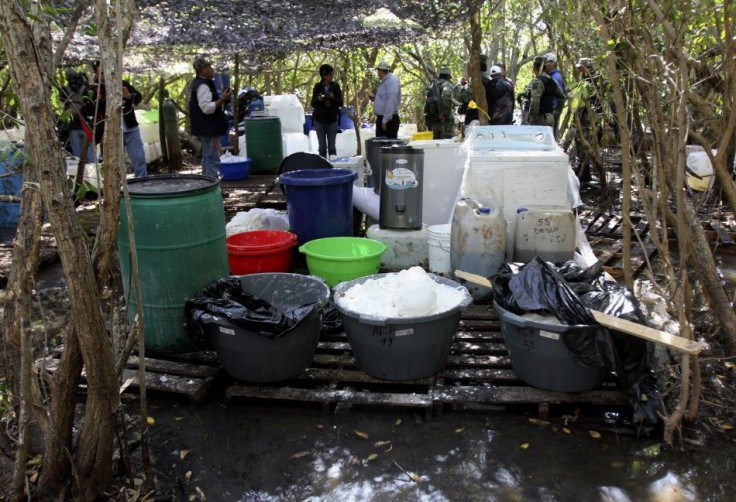Mexico Drug War: Army Seizes Huge Cache of Methamphetamines

The Mexican army said Thursday it has seized a 15-ton stash of methamphetamines in the western state of Jalisco – the largest such amount ever found by the authorities.
After an alleged tip-off, soldiers found the huge cache of drugs in a ranch in the town of Tlajomulco de Zuniga, just south of Guadalajara.
Associated Press reported that the amount seized was equal to half of all meth seizures around the world since 2009. AP added the street value of the haul was more than $4 billion.
According to reports, production of the synthetic drug has been increasing in Mexico and is thought to be controlled by the Sinaloa drug cartel – primarily for shipment to the U.S.
Troops also seized the equipment used to make the drug, but no arrests have yet ensued.
Gen. Gilberto Hernandez Andreu said the ranch was used by organized criminals as a giant meth lab.
It's an historic seizure: more than 15 tons of methamphetamines, five kilos of crystal, and around seven tons of precursor chemicals, Andreu said in a statement.
Meth, which may be injected, smoked, swallowed, or inhaled, creates an overwhelming psychological dependence in the abuser.
This [latest seizure] could potentially put a huge dent in the supply chain in the U.S, said U.S. Drug Enforcement Administration spokesman Rusty Payne.
When we're taking this much out of the supply chain, it's a huge deal.
So far this year, seven drug labs have been unearthed in Jalisco, according to the Mexican Defense Ministry.
The United Nations Office on Drugs and Crime reported last year that amphetamine-type stimulants have become the second most widely used illegal substance around the world. Interestingly, Mexico is not even the top maker of the drug – that dishonor goes to Holland and Myanmar (Burma).
Antonio Mazzitelli, the regional representative of the U.N. Office of Drugs and Crime, told reporters: Seizures of this size ... could mean one of two things. On one hand, it may be a product that hasn't been able to be sold, and like any business, when the market is depressed, stockpiles build up.
Mazzitelli added: Such large-scale production could suggest an expansion, an attempt by some Mexican groups, the most business-oriented I would say, to move into Latin American and Asian markets.”
© Copyright IBTimes 2024. All rights reserved.




















